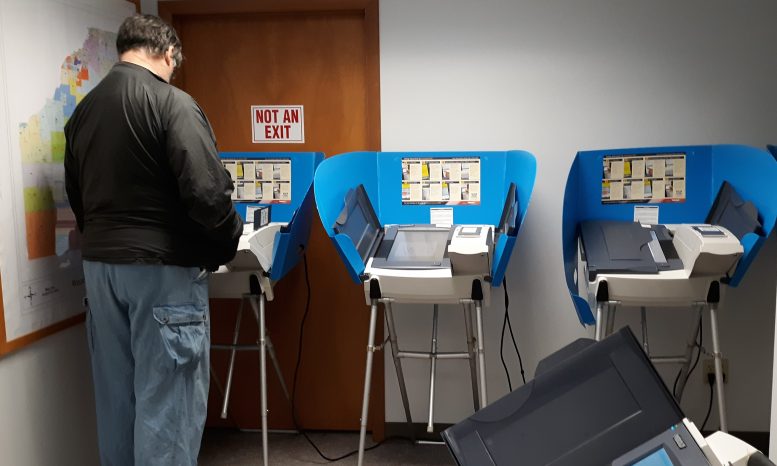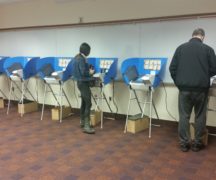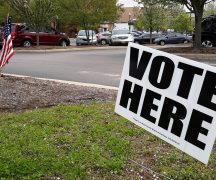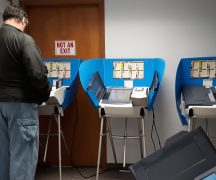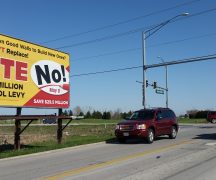By JAN LARSON McLAUGHLIN
BG Independent News
The Wood County Prosecutor’s Office has sent a letter asking the Ohio Elections Commission to look into the legality of campaign donors refusing to identify themselves to the Wood County Board of Elections.
The letter, signed by Wood County Prosecuting Attorney Paul Dobson and Assistant Prosecuting Attorney Linda Holmes, was submitted after the local board of elections voted last month to ask the Ohio Elections Commission to investigate the issue of anonymous campaign donations to an anti-school levy group prior to the November election.
At issue is whether anonymous donors who campaigned against the Bowling Green City School levy are required to reveal their identities.
Ohio election law requires that campaign donors and those who pay for election ads must be identified. But one anti-school levy campaign, called “Bowling Green Levy Facts,” in the last election refused to identify the source of more than $10,000 in advertising against the school levy, which lost by 32 votes.
The campaign claimed its anonymity was protected by the First Amendment. Donald J. McTigue, the Columbus attorney hired by “Bowling Green Levy Facts,” stated in a letter to the board of elections that his client does not need to reveal his identity
Never faced with such a request, the Wood County Board of Elections asked the Wood County Prosecutor’s Office to review the request for anonymity. Asking for the prosecutor’s office to get involved is standard practice in cases where the other entity involved has legal representation, explained Terry Burton of the board of elections.
The prosecutor’s office shared concerns that the anonymous donors were not complying with the law.
“The filer has not complied with the address, the signature and the signed certification of independent expenditures” required by the Secretary of State’s administrative rule, the letter from the prosecutor’s office stated.
McTigue, the attorney for the anonymous donors, cited the 1995 U.S. Supreme Court case of McIntyre v. Ohio Elections Commission, as supporting the claim for anonymity.
However, the prosecutor’s office letter pointed out that the McIntyre case deals with the freedom to publish political items anonymously. That is different than the issue in Wood County, the letter stated.
“The facts before the Wood County board involve the failure to provide the address and signature on a campaign finance form filed after an election and not leaflets circulated before an election with the purpose of influencing voters,” the letter said.
Unlike requiring a signature on leaflets circulated before an election, disclosure of donors’ names after the election does not taint or promote ideas influencing the vote outcome, the letter continued.
The four members of the board of elections – Republicans John Cuckler and Jon Jakubowski, and Democrats Andy Newlove and Mike Zickar – unanimously voted to ask the Ohio Elections Commission if the refusal to identify campaign donors complies with the Secretary of State’s administrative rules.
The board of elections members aren’t the only ones wanting answers.
Bowling Green citizen Roger Mazzarella has also filed an official complaint with the Ohio Elections Commission.
In his complaint to the Ohio Elections Commission, Mazzarella wrote: “One of the main themes of the anti-levy campaign was a call for more transparency and accountability of the BG City Schools administration and board. It is interesting and ironic that one campaign against the issue refuses to identify the source of over $10,000 spent to defeat the issue, claiming a First Amendment right to anonymity.
“It is logical to conclude that if there is no action by the Wood County Board of Elections and/or other state agencies, there will be a new precedent established in Wood County (and indeed in the entire state of Ohio) allowing anyone to hide behind the guise of anonymity during any election for or against an issue or candidate,” Mazzarella wrote in his complaint to the Ohio Elections Commission. “The electorate has the right to know who is financing campaigns for and against ballot issues and candidates and why.”
The Ohio Campaign Finance Handbook states that contributors may not remain anonymous by request. “If a donor does not want to be identified, then the contribution should not be made,” the handbook states.

